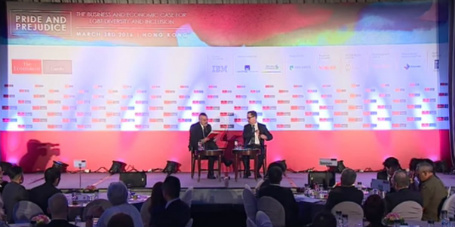The first Pride and Prejudice conference convened by the Economist Group on March 3rd 2016 demonstrated that there is not only a moral and ethical duty to LGBT inclusion, but also a powerful business and economic case.
The conference took place during the day in Hong Kong, London and New York. It brought together hundreds of executives, thought leaders, politicians, sports stars and activists, as well as Economist editors.
The speakers analysed why inclusion is good for the economy and the firms that embrace it. They explored best practices for employing and engaging LGBT workers, and how to market effectively to LGBT consumers.
On all three continents, there was also discussion of how business can play a leading role in advancing inclusion in places where they operate that currently have cultures or laws that are hostile to LGBT people.
Four of the key discussions are available to view below:
"The state of LGBT rights in Asia: the legal and political agenda"
Policy and legal approaches to same-sex relationships vary markedly across Asia. Despite efforts by the LGBT movement to advocate for decriminalisation and equal rights, in most Asian countries the drive for reform has stalled.
See below to watch Sol Aragones, Taiga Ishikawa, Mei-Nu Yu, and Nguyen Thanh Tu participate in this important discussion:
"The business inclusion of LGBT"
In this scene-setting interview we will hear from a leading chief executive on the business case for LGBT inclusion and the strategic importance of diversity for a global company.
Click below to watch Alan Joyce:
"EIU briefing: Attitudes and opinions toward LGBT inclusion in the workplace"
In this briefing, The Economist Intelligence Unit will share the results of a global survey commissioned for the Pride and Prejudice event series.
"The dollars and cents of discrimination"
Discrimination is difficult to quantify, yet it appears to have a real financial cost. A recent World Bank study claimed that institutionalised homophobia costs India between 0.1% and 1.7% of its GDP.
Click below to watch Simon Baptist and Lee Badgett in this joint video:

